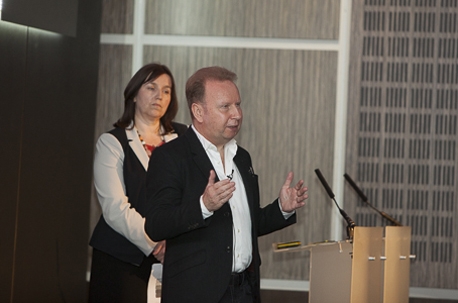NEWS18 March 2014
All MRS websites use cookies to help us improve our services. Any data collected is anonymised. If you continue using this site without accepting cookies you may experience some performance issues. Read about our cookies here.
NEWS18 March 2014
How Heinz and Greenpeace are tapping the unconscious for commercial gain.

“As researchers, we need approaches which reflect fast, implicit associations,” David Penn (pictured right), managing director of market research agency Conquest, told delegates today at MRS Annual Conference. “The more we think and consider, the further we get from our emotions. Scales and grids tend to engage cognition, not emotion.”
Sue Aydin (pictured left), European insight lead at Heinz, outlined some work the food and snacks giant has been working on alongside Conquest, and which she said had helped to give the team “faith” in the impact of implicit – rather than explicit – measurements.
She pointed specifically to a Heinz Beanz campaign which ran last summer and was designed to engage parents on an emotional level. Test and control studies revealed how the implicit measures reflected “good movements in strategically important areas” around health, warmth, and nourishment – although had Heinz focused on explicit brand scores alone, the results would have been perceived as disappointing.
“It’s all about going beyond the obvious,” added Penn, who said that much of what we know lies beyond the reach of explicit techniques which tend to measure obvious or ‘default’ associations. “The power comes from the conjunction of the explicit with the implicit or emotional,” he said.
Work carried out by Greenpeace and BrainJuicer was also outlined at the session on ideas for tapping the unconscious for commercial gain. It highlighted the potential benefits to charities in focusing on messages more centred around gain than pain.
“We still have a very heavy tendency towards pain prevention,” said Greenpeace’s Juliette Hauville, “Some campaigns are really hard to reframe positively. But we feel the bold switch was worth it.” She noted an increase in ‘likes’ on the Greenpeace Facebook page, with BrainJuicer’s Will Headley pointing out that the one emotion – or non-emotion – to avoid altogether was neutrality.
Related Articles
0 Comments